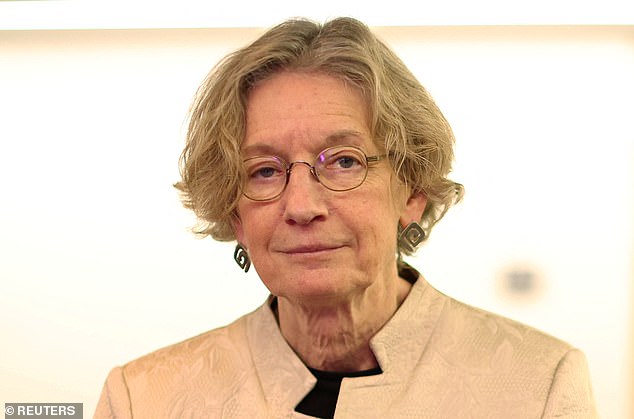Britain must not be “lured” into believing the battle against inflation is over, a senior Bank of England official has warned.
The Bank cut interest rates earlier this month for the first time since 2020 after inflation returned to its 2 percent target, having peaked at 11.1 percent in October 2022.
But official figures are expected this week to show the index is rising again.
Hawk: Catherine Mann (pictured) was one of four members of the Bank’s nine-member Monetary Policy Committee who voted to leave rates unchanged this month.
Catherine Mann was one of four members of the Bank’s nine-member Monetary Policy Committee (MPC) who voted this month to leave rates unchanged and remains concerned about upward pressure on prices.
“Inflation is down, but we shouldn’t be seduced by headline inflation,” Mann told a Financial Times podcast, pointing to the role played by factors such as rapidly falling energy prices.
The Bank cut its benchmark interest rate to 5 percent from 5.25 percent on August 1, but warned that it would not make further reductions “too large or too fast” in the coming months.
After falling to its target, inflation is expected to temporarily rise to just below 3 percent later this year.
Official figures released tomorrow are expected to show the headline rate rose to 2.3 percent in July.
Rate-setters are keeping an eye on underlying factors such as inflation in the services sector (which includes bars, hairdressers and law firms), which remains at more than 5 percent, well above the headline level.
Officials fear that evidence of large wage increases means these price rises will persist.
Mann said it would take years for wage growth to catch up with the price increases that have already taken place, meaning it would be a “long time” before that growth slows.
This would have an impact on the time it takes to reduce inflation in the services sector.
Another factor is the lack of available workers in the UK. Mann said: “There are a lot of vacancies, there is a lot of desire to hire people and there don’t seem to be any workers available, and of course that is part of the wage-setting process.”
He said pay pressures will remain a major issue next year, with higher-paid staff seeking increases in line with what some of their lower-paid colleagues received this year.
“Some people at the bottom got a significant increase, and rightly so, but those at the top did not, which means they will get one next year,” he said.
Mann added that “exactly the same thing” happened with prices, with companies following their rivals and raising their prices.
“There is an increase in the wage-setting process and in the price-setting process, and that is the upward risk, which could well be structural, having been created during this period of very high inflation,” he said.
‘That increase in pressure will take a long time to disappear.’
DIY INVESTMENT PLATFORMS

AJ Bell

AJ Bell
Easy investment and ready-to-use portfolios

Hargreaves Lansdown

Hargreaves Lansdown
Free investment ideas and fund trading

interactive investor

interactive investor
Flat rate investing from £4.99 per month

Saxo

Saxo
Get £200 back in trading commissions

Trade 212

Trade 212
Free treatment and no commissions per account
Affiliate links: If you purchase a product This is Money may earn a commission. These offers are chosen by our editorial team as we believe they are worth highlighting. This does not affect our editorial independence.


